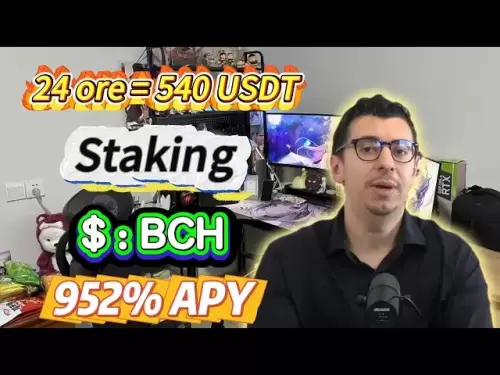-
 Bitcoin
Bitcoin $108,338.0981
-0.13% -
 Ethereum
Ethereum $2,566.4077
1.16% -
 Tether USDt
Tether USDt $1.0001
-0.01% -
 XRP
XRP $2.2841
-2.59% -
 BNB
BNB $658.5241
-0.17% -
 Solana
Solana $150.3819
-1.08% -
 USDC
USDC $0.9999
-0.01% -
 TRON
TRON $0.2864
-0.24% -
 Dogecoin
Dogecoin $0.1694
0.24% -
 Cardano
Cardano $0.5813
-0.72% -
 Hyperliquid
Hyperliquid $37.8292
-4.60% -
 Bitcoin Cash
Bitcoin Cash $503.3593
1.69% -
 Sui
Sui $2.8784
-0.69% -
 Chainlink
Chainlink $13.4784
-0.43% -
 UNUS SED LEO
UNUS SED LEO $9.0793
-0.27% -
 Stellar
Stellar $0.2537
-0.41% -
 Avalanche
Avalanche $18.0047
-0.23% -
 Shiba Inu
Shiba Inu $0.0...01181
1.56% -
 Hedera
Hedera $0.1608
0.49% -
 Toncoin
Toncoin $2.7568
-0.93% -
 Litecoin
Litecoin $86.4121
-0.20% -
 Monero
Monero $313.7273
-0.86% -
 Polkadot
Polkadot $3.3715
-0.66% -
 Dai
Dai $1.0001
0.01% -
 Ethena USDe
Ethena USDe $1.0004
0.03% -
 Bitget Token
Bitget Token $4.2902
-0.54% -
 Uniswap
Uniswap $7.5361
2.73% -
 Aave
Aave $285.6090
-0.55% -
 Pepe
Pepe $0.0...09958
0.28% -
 Pi
Pi $0.4560
-0.65%
What licenses do Bitcoin payment platforms need to operate legally?
2025/04/21 03:49

Operating a Bitcoin payment platform involves navigating a complex landscape of regulatory requirements that vary significantly by jurisdiction. To ensure that your platform operates legally, it is essential to understand and obtain the necessary licenses. This article will delve into the key licenses required for Bitcoin payment platforms, focusing on some of the most common jurisdictions.
Understanding the Need for Licenses
Operating a Bitcoin payment platform without the proper licenses can lead to severe legal repercussions, including fines and shutdowns. Licenses are crucial as they ensure that platforms adhere to anti-money laundering (AML) and know-your-customer (KYC) regulations, which are designed to prevent illegal activities such as money laundering and terrorist financing. By obtaining these licenses, platforms demonstrate their commitment to compliance and security, fostering trust among users and regulatory bodies.
Money Transmitter License in the United States
In the United States, one of the most critical licenses for a Bitcoin payment platform is the Money Transmitter License (MTL). This license is required at both the federal and state levels, and the requirements can vary significantly from one state to another.
Federal Level: At the federal level, platforms must register with the Financial Crimes Enforcement Network (FinCEN) as a Money Services Business (MSB). This involves submitting a registration form and paying a fee. Additionally, platforms must comply with the Bank Secrecy Act (BSA), which mandates the implementation of AML and KYC policies.
State Level: On a state level, the requirements for an MTL can differ widely. For instance, states like New York require a BitLicense, which is specifically designed for businesses dealing with cryptocurrencies. To obtain a BitLicense, platforms must submit a detailed application, including business plans, compliance policies, and financial statements. The application process can be lengthy and costly, but it is essential for operating legally in New York.
Payment Institution License in the European Union
In the European Union, Bitcoin payment platforms must comply with the Payment Services Directive (PSD2), which requires a Payment Institution License. This license ensures that platforms adhere to strict regulations regarding payment processing, consumer protection, and data security.
Application Process: To obtain a Payment Institution License, platforms must submit an application to the relevant national authority in the EU member state where they wish to operate. The application typically includes detailed information about the business, its management, and its compliance policies. The authority will review the application and may conduct an on-site inspection before granting the license.
Compliance Requirements: Once licensed, platforms must adhere to ongoing compliance requirements, such as maintaining adequate capital reserves, implementing robust AML and KYC procedures, and reporting suspicious transactions to the relevant authorities.
Financial Services Provider License in Australia
In Australia, Bitcoin payment platforms must obtain a Financial Services Provider (FSP) License from the Australian Securities and Investments Commission (ASIC). This license is required for businesses that provide financial services, including those related to cryptocurrencies.
Licensing Requirements: To apply for an FSP License, platforms must submit a detailed application to ASIC, including information about their business operations, financial status, and compliance policies. The application process involves a thorough review by ASIC, which may include interviews and on-site inspections.
Ongoing Obligations: Once licensed, platforms must comply with ongoing obligations, such as maintaining adequate financial resources, implementing effective AML and KYC measures, and reporting any significant changes to their business to ASIC.
Virtual Asset Service Provider Registration in Japan
Japan has been at the forefront of cryptocurrency regulation, requiring Bitcoin payment platforms to register as Virtual Asset Service Providers (VASPs) with the Financial Services Agency (FSA). This registration process is rigorous and designed to ensure that platforms operate securely and transparently.
Registration Process: To register as a VASP, platforms must submit a detailed application to the FSA, including information about their business operations, security measures, and compliance policies. The FSA conducts a thorough review of the application, which may include on-site inspections and interviews with key personnel.
Compliance Requirements: Once registered, platforms must adhere to strict compliance requirements, such as implementing robust security measures to protect user funds, maintaining adequate capital reserves, and reporting suspicious transactions to the FSA. Additionally, platforms must undergo regular audits to ensure ongoing compliance with regulatory standards.
Money Service Business License in Canada
In Canada, Bitcoin payment platforms must obtain a Money Service Business (MSB) License from the Financial Transactions and Reports Analysis Centre of Canada (FINTRAC). This license is required for businesses that engage in money services, including those related to cryptocurrencies.
Licensing Requirements: To apply for an MSB License, platforms must submit a detailed application to FINTRAC, including information about their business operations, ownership structure, and compliance policies. The application process involves a thorough review by FINTRAC, which may include background checks on key personnel.
Compliance Obligations: Once licensed, platforms must comply with ongoing obligations, such as implementing effective AML and KYC measures, maintaining detailed records of transactions, and reporting any suspicious activities to FINTRAC. Additionally, platforms must undergo regular audits to ensure compliance with regulatory standards.
Frequently Asked Questions
Q: Can a Bitcoin payment platform operate globally with just one license?
A: No, a Bitcoin payment platform typically needs to obtain licenses in each jurisdiction where it operates. Regulatory requirements vary significantly by country, and operating without the necessary licenses can lead to legal issues.
Q: How long does it typically take to obtain a Money Transmitter License in the United States?
A: The time it takes to obtain a Money Transmitter License can vary widely depending on the state. On average, the process can take anywhere from a few months to over a year, depending on the complexity of the application and the thoroughness of the review process.
Q: Are there any exemptions for Bitcoin payment platforms from obtaining certain licenses?
A: Some jurisdictions offer exemptions or simplified licensing processes for certain types of businesses. For example, in the EU, small payment institutions may be exempt from certain requirements of the Payment Institution License. However, these exemptions are rare and typically come with strict conditions.
Q: What happens if a Bitcoin payment platform fails to comply with licensing requirements?
A: Failure to comply with licensing requirements can result in severe penalties, including fines, legal action, and the shutdown of the platform. Regulatory bodies take non-compliance very seriously, as it can pose significant risks to consumers and the financial system.
免責聲明:info@kdj.com
所提供的資訊並非交易建議。 kDJ.com對任何基於本文提供的資訊進行的投資不承擔任何責任。加密貨幣波動性較大,建議您充分研究後謹慎投資!
如果您認為本網站使用的內容侵犯了您的版權,請立即聯絡我們(info@kdj.com),我們將及時刪除。
- Kraken,後機翼和Memecoins:狂野前往新加坡大獎賽!
- 2025-07-09 00:50:12
- Cronos SkyOlocket:解碼CRO的加密速度的原因
- 2025-07-09 01:30:12
- 以太坊的華爾街Love&Ruvi AI的審計集會:加密雞尾酒
- 2025-07-09 00:55:12
- 具有增長潛力的加密硬幣:精明投資者的首選
- 2025-07-09 01:35:13
- Onyxcoin(XCN)vs. Solana(Sol):加密遊戲中的一個有希望的賭注?
- 2025-07-09 00:30:12
- CoreWeave的大膽下注:AI如何重塑比特幣採礦
- 2025-07-09 00:30:12
相關知識

How to customize USDT TRC20 mining fees? Flexible adjustment tutorial
2025-06-13 01:42:24
<h3>Understanding USDT TRC20 Mining Fees</h3><p>Mining fees on the TRON (TRC20) network are essential for processing transactions. U...

USDT TRC20 transaction is stuck? Solution summary
2025-06-14 23:15:05
<h3>Understanding USDT TRC20 Transactions</h3><p>When users mention that a USDT TRC20 transaction is stuck, they typically refer to ...

How to cancel USDT TRC20 unconfirmed transactions? Operation guide
2025-06-13 23:01:04
<h3>Understanding USDT TRC20 Unconfirmed Transactions</h3><p>When dealing with USDT TRC20 transactions, it’s crucial to understand w...

How to check USDT TRC20 balance? Introduction to multiple query methods
2025-06-21 02:42:53
<h3>Understanding USDT TRC20 and Its Importance</h3><p>USDT (Tether) is one of the most widely used stablecoins in the cryptocurrenc...

What to do if USDT TRC20 transfers are congested? Speed up trading skills
2025-06-13 09:56:41
<h3>Understanding USDT TRC20 Transfer Congestion</h3><p>When transferring USDT TRC20, users may occasionally experience delays or co...

The relationship between USDT TRC20 and TRON chain: technical background analysis
2025-06-12 13:28:48
<h3>What is USDT TRC20?</h3><p>USDT TRC20 refers to the Tether (USDT) token issued on the TRON blockchain using the TRC-20 standard....

How to customize USDT TRC20 mining fees? Flexible adjustment tutorial
2025-06-13 01:42:24
<h3>Understanding USDT TRC20 Mining Fees</h3><p>Mining fees on the TRON (TRC20) network are essential for processing transactions. U...

USDT TRC20 transaction is stuck? Solution summary
2025-06-14 23:15:05
<h3>Understanding USDT TRC20 Transactions</h3><p>When users mention that a USDT TRC20 transaction is stuck, they typically refer to ...

How to cancel USDT TRC20 unconfirmed transactions? Operation guide
2025-06-13 23:01:04
<h3>Understanding USDT TRC20 Unconfirmed Transactions</h3><p>When dealing with USDT TRC20 transactions, it’s crucial to understand w...

How to check USDT TRC20 balance? Introduction to multiple query methods
2025-06-21 02:42:53
<h3>Understanding USDT TRC20 and Its Importance</h3><p>USDT (Tether) is one of the most widely used stablecoins in the cryptocurrenc...

What to do if USDT TRC20 transfers are congested? Speed up trading skills
2025-06-13 09:56:41
<h3>Understanding USDT TRC20 Transfer Congestion</h3><p>When transferring USDT TRC20, users may occasionally experience delays or co...

The relationship between USDT TRC20 and TRON chain: technical background analysis
2025-06-12 13:28:48
<h3>What is USDT TRC20?</h3><p>USDT TRC20 refers to the Tether (USDT) token issued on the TRON blockchain using the TRC-20 standard....
看所有文章

























































































